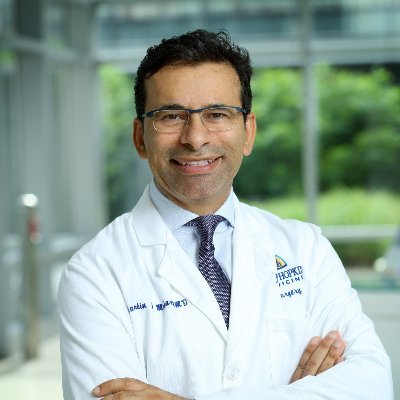Laparoscopic Pancreas Surgery
Dr. Makary is a laparoscopic pancreas surgeon specializing in minimally-invasive pancreas resections. A graduate of Thomas Jefferson and Harvard Universities, he completed laparoscopic surgery training at Georgetown and open pancreas surgery training at Johns Hopkins with Dr. John Cameron before joining the group.
Dr. Makary is the Mark Ravitch Chair in Gastrointestinal Surgery at Johns Hopkins and serves as the Director of the Johns Hopkins Center for Surgical Outcomes Research.
For patients without metastatic disease, a surgical opinion is available by sending a CD of a CAT scan to:
Martin A. Makary M.D.
Johns Hopkins Hospital
Cancer Research Bldg. II, Suite 507
1550 Orleans Street
Baltimore, MD 21231
Next-Day Appointments Available by Calling: (410) 502-6845
Email: [email protected]

Hi Dr. Makary, as a critic of healthcare, I’ve often cited your assertion that medical error is the third leading cause of death in the U.S. Have you responded to this critique ?
Sorry, link: https://emcrit.org/wp-content/uploads/2018/07/Unreliable-Research-on-Error-Related-Hospital-Deaths-in-America-Gianoli-and-Dunn.pdf
On page 31 of Blind Spots – ‘statins lower the incidence of heart attacks by 25 to 35%’. I think this may be in relative terms as Lipitor ad says – ‘In a large clinical study, 3% of patients taking a sugar pill had a heart attack compared to 2% of patients taking Lipitor.’ The ‘real’ absolute risk reduction of 1%.
Some added info: There was a trial called JUPITER (“Justification for the Use of Statin in Prevention: an Intervention Trial Evaluating Rosuvastatin”). It was one of the first trials for rosuvastatin (brand name Crestor). The trial found that the rate of heart attacks in the placebo group was 0.75 percent, while the rate in people given a statin was about 0.40 percent—we’re talking about less than 1 percent of all people. But because 0.40 is about half of 0.75, the ads for Crestor said, “reduces heart attacks by 50 percent.” It’s mind-boggling. So, the public needs to understand that whatever effects statins may have are very small and only apply to people who already have had a heart attack. For primary prevention, meaning for people who have not had a heart attack, the benefit is negligible—almost zero.